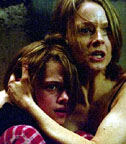
Movie Guru Rating:

Comment
on this review
| |

With Panic Room, David Fincher invades Hitchcock's home to steal a solid thriller.
by Coury Turczyn
It's difficult to know what to make of director David Fincher. Pulp auteur? Dark visionary? Or MTV hack with delusions of grandeur? Based on his short filmography, you could arrive at all three conclusions without breaking a critical sweat. In fact, let's take the perspiration test right now.
Pulp auteur: Se7en, Fincher's breakout hit from 1995, instantly made him the hipster director of the moment. Movie studios wanted to sleep with him, and film students wanted to be him. Unfortunately, this resulted in a nonstop parade of dimly lit serial-killer movies with Nine Inch Nails sound-alikes on the soundtracks—a trend we still haven't escaped (upcoming: Murder by Numbers). Nevertheless, Se7en exudes a grim sense of doom that elevates it beyond the usual hack 'n' slash thriller—it's genuinely foreboding and hard to shake.
Dark visionary: With 1999's Fight Club, Fincher finally got a script that matched his visual dynamics. The wickedly funny dialogue and a satiric theme pummeling consumer culture was even more memorable than Fincher's lighting design—a first for the director. Fight Club's critical regard is improving as it ages, and it'll probably be remembered as one of the best American movies of the '90s.
MTV hack with delusions of grandeur: Alien3 (1992) marked Fincher's ascension from making Madonna videos into the big leagues of major motion pictures—and boy, is it ever dull. Yup, there's plenty of trademark gloominess and swooping camera moves full of portent, and all of it leads to...not much.
With Panic Room, his latest, I'm afraid David Fincher is going to confound critics once again, just as he did with 1997's The Game. Panic Room has a pulpy plot yet it's so ravishingly shot that it certainly looks more important than just another victims vs. intruders movie, so...is it? Is Fincher a craftsman, an artist, or a hack? A number of critics have opted for hack. Me, I'm going to split the difference and call him a craftsman with flashes of artistic brilliance.
Panic Room is a superior thriller in every way that counts—plotting, characterization, construction—yet it never quite takes the viewer beyond the conventions of its storyline. Perhaps it's unfair to expect anything more from a thriller than just good thrills, but Panic Room is so self-consciously Hitchcockian that you can't help but anticipate the added dimension of, say, a theme or an idea or maybe just true cleverness. From the North By Northwest-style title sequence and Howard Shore's Bernard Herrmann-like score, Panic Room sets itself up for the Great Hitchcock Comparison. In the opening scenes, as Fincher details the movie's only set—a colossal New York brownstone house—shades of Rear Window or Rope cast themselves onto the film. It's a daunting challenge to boldly hike into Hitchcock's terrain, and many a director has fallen by the wayside; Fincher gamely trods uphill, though I'm afraid he doesn't quite reach the summit.
Jodie Foster stars as the newly divorced and filthy rich New Yorker Meg Altman. She and her daughter Sarah (Kristen Stewart) are looking for a new home when they tour a spectacular brownstone that's new to the market. Perhaps as a monetary revenge against her cheating ex-husband, she buys the house even though it's much too large for just two people. The brownstone also has a special feature: a pillbox-like hideaway equipped with steel shielding and a video surveillance system—for use in case of "home invasion." And wouldn't you know it, on the very first night Meg and Sarah move in, three intruders break into the house.
Scriptwriter David Koepp does a fine job of making Panic Room's villains interesting, which saves the movie from being like most other "thrillers" of today where villains are bad—just really, really bad. Here, we have Forest Whitaker as Burnham, a home security expert who needs money to keep custody of his children. He's smart, calm, and desperate enough to align himself with Junior (Jared Leto), a flighty, fast-talking jerk who fancies himself the "brains" of the outfit; Junior seems to enjoy playing at being a master thief more than actually thieving. As leader, he decides to bring in the tight-lipped and ambitiously homicidal Raoul (Dwight Yoakam) as muscle for the operation.
Naturally, everything goes straight to hell for the trio, particularly when Meg and Sarah successfully escape into the panic room—right where Junior is convinced a lot of money is hidden. Watching the trio of would-be thieves interact is half the fun here: When will Burnham wisely opt out? How will Junior piss his partners off next? What's Raoul's agenda? Meanwhile, Meg and Sarah have their own, less captivating relationship issues as they struggle to think of countermeasures. The resulting battle of wills is, well, thrilling.
While there are certainly moments in Panic Room that spur a desire to scream advice at Foster's character, you can't fault the film for great lapses in logic. Everything fits together well and mostly makes sense. The editing and Fincher's omnipowerful camera create true tension, even though it's sometimes difficult to work up a strong affection for Meg. Foster, while smart and beautiful and talented, doesn't inspire much emotional empathy as an actress, which would've been useful in a victim-turned-hero role.
As a thriller, Panic Room delivers the goods. As genre entertainment that aspires to art, the package doesn't quite make it. But leave that fussing to critics and cineastes; once you toss the Hitchcock allusions out the window, Panic Room is an enjoyable diversion.
Coury Turczyn is the editor of PopCult.

April 4, 2001 * Vol. 12, No. 14
© 2000 Metro Pulse
|





